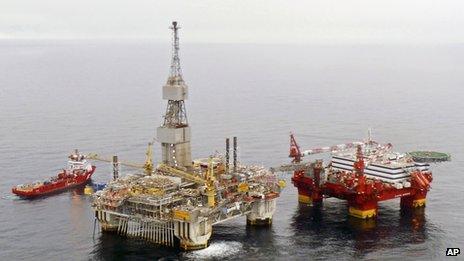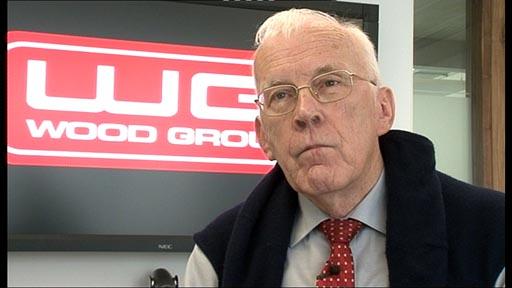Creaky joints of ageing oil
- Published

Statoil evacuated workers from the Flotel Superior, right, and the Njord A-platform in the Norwegian Sea
Two North Sea oil platforms have been evacuated, due to fears about structural safety.
One is at risk of its legs collapsing due to structural defects. That would pitch the platform into the water, possibly rupturing pipelines on the seabed.
The problem on the Yme platform has closed down operations since July, burning a big hole in the accounts of its operator, Talisman.
The other evacuation saw more than 300 people helicoptered to safety this week, in snow, a gale and 10 metre waves. This was due to the puncturing of a stabilisation tank by an anchor on a floating accommodation platform.
You may not have heard much about either unless you've been paying attention to the Norwegian sector of the North Sea, where both incidents took place, and remain unresolved.
Ageing: a state of mind
It's not clear that either is definitively due to the age of the platforms, but they highlight the problem of equipment at risk of going wrong because of the North Sea's maturity.
A report by the UK's Health and Safety Executive this week said more needs to be done to prepare for the challenges of ageing platforms and pipelines.
It stated that recent inspections have found management well aware of responsibilities, and listing many areas in which planning, monitoring and testing is already under way.
But it included long 'to do' lists to make sure old platforms, operating in very challenging corrosive conditions, are not putting offshore workers or the environment at risk.
"The industry still has much to do to ensure that installation long-term plans anticipate and manage the effects of equipment and infrastructure degradation," said the report.
It began with some big numbers to highlight the risk of ageing. Onshore studies show that around 60% of major accident incidents are related to technical integrity, and of these half have ageing as a contributory factor.
The European Union's Major Accident Hazards Bureau reckons that 28% of all reported major accidents involving a 'loss of containment' are due to ageing.
Yet the economics of producing oil and gas mean that old assets are being sweated.
So long as the price justifies it, and as technology finds new ways of extracting more from reservoirs, old platforms are having their lives extended far beyond their expected spans.
Around half of fixed platforms in the UK sector of the North Sea have exceeded their original design life, which was often 25 years. Many floating installations are heading the same way.
"Ageing," it is pointed out, "is not about how old your equipment is; it's about what you know about its condition and how that's changing over time." Wise words.
Dirty business
Talking of wise words, Sir Ian Wood has picked up another award, this one for lifetime achievement and from Oil and Gas UK, the industry body.
The recently-retired chairman of Wood Group is cited as "one of this industry's foremost figures for decades, and one of the greatest industrialists this country has ever produced".
He took the opportunity to talk about the need to bring on the next generation of recruits.
I heard from Sir Ian about a similar subject, when I interviewed him at length just ahead of his retirement.
He said the industry has to improve its image not only for recruits, but for the next stage of its development.
His view is that it's been seen as a dirty and unattractive line of work, and hasn't done much to explain what it contributes to the economy.
That is changing, said Sir Ian, arguing that it will have to, as fracking of shale oil comes closer to home.
If Big Oil and Fast Expanding Gas are to persuade people to accept the risks from blasting high pressure chemicals into rocks deep under their homes, the industry is going to have to get much closer to those communities.
You can hear my interview with Sir Ian Wood on Business Scotland, BBC Radio Scotland, 6am on Saturday 10 November, and 10am on Sunday 11 November. A televised version of it is scheduled to be shown several times on the BBC News Channel on 17 and 18 November.
You can also comment or follow Douglas Fraser on Twitter: @BBCDouglsFraser
- Published9 November 2012
